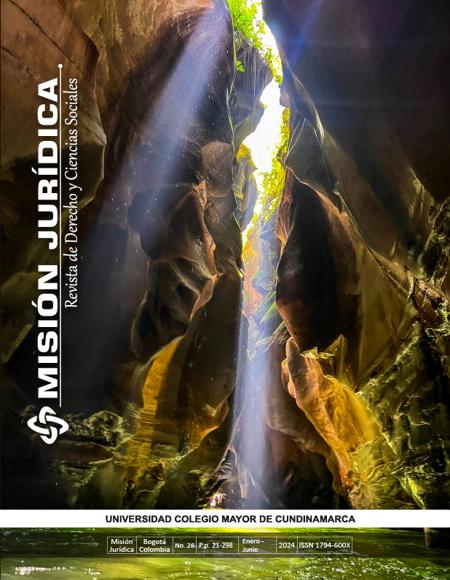Restructuring the Judiciary in the State of Paraíba, Brazil: An Analysis of Legal Actors' Discourses in Light of the Principle of Efficiency
Reestructuración en la organización del poder judicial del estado de Paraíba, Brasil: Un análisis de los discursos de los actores jurídicos a la luz del principio de eficiencia

This work is licensed under a Creative Commons Attribution-NonCommercial-NoDerivatives 4.0 International License.
COPYRIGHT PROVISIONS
Every papper included in the magazine can be reproduced whole or in part, provided that respect for its original content, the source is acknowledged and is used with non-commercial academic. Legal mission and its content is protected under a license Creative Commons Attribution-Noncommercial-

Misión Jurídica is distributed under a Creative Commons Attribution-NonCommercial-NoDerivar 4.0 International License.
Based on a work in http://unicolmayor.edu.co/publicaciones/index.php/mjuridica/index.
Permits that go beyond what is covered by this license can be found at http://unicolmayor.edu.co/publicaciones/index.php/mjuridica/index.
Show authors biography
With the recent financial crises and the lack of resources faced by the State, its branches, and various entities have been promoting a restructuring of their administrative organization. In this scenario, the State Judiciary of Paraíba (TJPB) was no exception. It had to adopt internal measures to navigate this situation, particularly the public policy of closing courthouses scattered throughout the State. To address these issues, this work aimed to analyze and assess this restructuring in light of the constitutional principle of efficiency, while also addressing the main social implications such measures could cause, especially concerning the constitutional principles of broad judicial protection and the dignity of the human person. Based on important legal scholars, the theoretical framework covered essential topics for understanding the issue, such as the basic organization of the Brazilian public administration and the constitutional principles applicable to public administration. The methodology used was descriptive, qualitative, and bibliographic, also employing the method of argumentation analysis from the New Rhetoric theory. In the discussion of the topic, the reasons justifying the closure of courthouses by the judiciary were made explicit, as well as the reasons and counterarguments expressed by civil society entities that criticized these measures based on the social impacts they will cause. Thus, it became evident that administrative measures cannot apply the principle of efficiency solely through technical or quantitative perspectives but must also weigh social consequences as relevant criteria.
Article visits 5 | PDF visits 1
Downloads
- Araújo, M. L. C. de. (2009). Jurisdição Constitucional e Federação. O Princípio da Simetria na Jurisprudência do STF. Rio de Janeiro/RJ: Elsevier Editora.
- Brasil. (1967). Decreto-Lei nº 200 de 25 de fevereiro de 1967. Diário Oficial da República Federativa do Brasil, Poder Executivo, Brasília, DF, 27 de fevereiro de 1967. Disponível em: http://www.planalto.gov.br/ccivil_03/decreto-lei/del0200.htm. [Acesso em: 28 de março de 2023].
- Brasil. (1988). Constituição da República Federativa do Brasil. Diário Oficial da República Federativa do Brasil, Poder Legislativo, Brasília, DF, 5 de outubro de 1988. Anexo, p. 1. Disponível em: http://www.planalto.gov.br/ccivil_03/constituicao/constituicaocompilado.htm. [Acesso em: 28 de março de 2023].
- Bresser-Pereira, L. C. (1998). Uma reforma gerencial da administração pública no Brasil. Revista do Serviço Público - RSP, 49(1), 5-42.
- Carvalho Filho, J. dos S. (2023). Manual de Direito Administrativo. São Paulo: Editora Atlas.
- Conselho Nacional de Justiça. (2013). Resolução nº 184, de 6 de dezembro de 2013. Dispõe sobre os critérios para criação de cargos, funções e unidades judiciárias no âmbito do Poder Judiciário. Brasília: CNJ. Disponível em: https://atos.cnj.jus.br/files/resolucao_184_06122013_09122013130258.pdf. [Acesso em: 8 de abril de 2023].
- Conselho Nacional de Justiça. (2019). Procedimento de Controle Administrativo (PCA): 0008324-42.2019.2.00.000. Conselheiro relator: Luiz Fernando Tomasi Keppen. Distribuído em 28/10/2019. Disponível em PJE/CNJ.
- Di Pietro, M. S. Z. (2019). Direito Administrativo. Rio de Janeiro: Editora Forense.
- Fonseca, R. C. V. (2012). Metodologia do Trabalho Científico. Curitiba: IESDE Brasil S.A.
- Hodun, M. (2015). Doctrine of Implied Powers as a Judicial Tool to Build Federal Polities: Comparative Study on the Doctrine of Implied Powers in the European Union and the United States of America (Tese de Doutorado, School of Law, Reykjavik University). Islândia.
- Leimieux, S. (2017). Judicial Supremacy, Judicial Power, and the Finality of Constitutional Rulings. Perspectives on Politics, 15(4), 1067-1081.
- Montesquieu, Charles-Louis de Secondat, barão de (2009). The Spirit of the Laws. Tradução de Thomas Nugent. Ed. Cosimo Classics, 2009.
- Oliveira Netto, A. A. (2006). Metodologia da Pesquisa Científica: guia prático para apresentações de trabalhos acadêmicos. Florianópolis: Editora Visual Books.
- Oliveira, R. C. R. (2021). Curso de Direito Administrativo. Rio de Janeiro: Editora Forense.
- Paraíba. (2010). Lei Complementar nº 96 de 3 de dezembro de 2010. Diário Oficial do Estado da Paraíba, Poder Legislativo, João Pessoa, PB, 3 de dezembro de 2010. Disponível em: https://www.irib.org.br/files/obra/Cdigo_de_Normas_TJ_PB.pdf. [Acesso em: 8 de abril de 2022].
- Perelman, C., & Olbrechts-Tyteca, L. (2005). Tratado da Argumentação. A Nova Retórica. São Paulo: Martins Fontes.
- Silva, J. A. da. (2016). Curso de Direito Constitucional Positivo. São Paulo: Editora Malheiros.
- SINTAJ-PB. Sindicato dos técnicos e analistas do Poder judiciário da Paraíba. (2019). Política de DESpriorização do 1º Grau. Disponível em: https://sintaj.com.br/politica-de-despriorizacao-do-1o-grau/. [Acesso em: 8 de abril de 2023].
- Tribunal de Justiça do Estado da Paraíba. (2019). Processo Administrativo PA-TJ 2019201612: Projeto de Resolução que dispõe sobre a desinstalação da Comarca de Malta e sua agregação à Comarca de Patos. Documento interno, publicado no PJE. Documento 13, página 1, assinado por Arnobio Alves Teodosio [110.612.274-72] em 08/10/2019.















